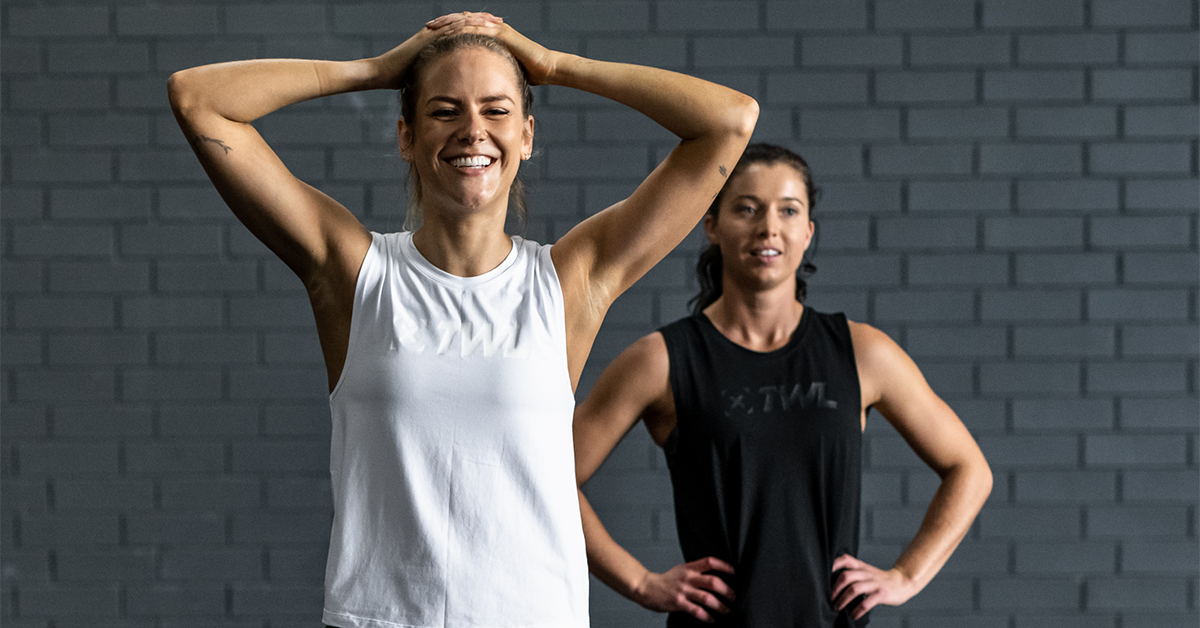If a stranger asks you what motivates people to exercise, the first answer that’s going to pop in your head might be one of the following: achieve that Instagrammable body, build muscle, lean out, and maybe even get those six-pack abs. Perfectly normal answers. On the front pages of magazines, textbooks, advertisements, commercials, and television, we’ve all been taught about the physical benefits of exercise. But the mental health benefits of exercise are mentioned far less frequently.
Mental health affects every aspect of our life. The saying “mind over matter” rings true. If we want to be the best version of ourselves, learning to take care of ourselves not just physically, but also mentally, is key.
If you’ve been needing more reasons to tackle that next sweat sesh, here are five mental health benefits of exercise that will have you going back to the gym for more.
Shop Now
5 Mental Health Benefits of Exercise You Need to Know About
1. Improved Self-Confidence
More often than not, our self-esteem issues can be traced back to our perception of our own bodies. Maybe you think you don’t look fit enough to go to the gym. Maybe you don’t feel so cute after you’ve downed a whole pizza on a Thursday night. (Hey, we’ve all done it.) Maybe you don’t think you’re curvy enough to wear a dress on a date.
Sure enough, research has found that regular exercise can help boost your confidence and self-esteem. Furthermore, frequently engaging in physical activity can help you make other healthier lifestyle choices — like opting for more nutritious food and sitting less throughout the day.
Psst! Don’t forget to read our blog about five lifestyle habits that hurt your training.
When you exercise, you strengthen your muscles and improve your stamina. Over time, you’re going to see these results reflected on your body. Once you start feeling better physically, you’re going to feel better mentally. When you become more confident from the gym, that confidence will likely carry over to other aspects of your life.
Not only will your self-confidence and self-esteem increase, but you will also develop a more positive outlook towards life and yourself, making this one of many mental health benefits of exercise. We call that a win.
2. Help with Depression, Stress, and Anxiety
Many times, research has demonstrated that exercise is an effective way to battle the symptoms of depression.
In a study conducted by the Department of Psychology at the University of Missouri-Columbia to test if aerobic fitness has beneficial effects on psychological outcomes, results showed that depressed participants alleviated the symptoms of depression, stress, and anxiety, and showed improvement in self-concept after 12 weeks of training.
Because exercise imitates the effects of stress, it helps train your body to combat those sensations. When you frequently subject your body to physical stress, the body learns how to recover and cope with stressors, both physically and mentally.
Exercising also temporarily frees us from the noise in our heads. Allotting hours to fitness will significantly lessen the time you spend entertaining negative thoughts.
3. Boost Your Mood
Plain and simple, people who regularly exercise are likelier to be happy.
Physical activity triggers the release of “happy chemicals” called endorphins. Endorphins elicit a positive feeling in our bodies and they decrease our perception of pain. This is the science behind “runner’s high” or the feelings of euphoria that you get after working out. Pay special attention to how you feel 30-60 minutes after your workout. Research says that this is when those feel-good chemicals are likely released.

4. Sleep Better at Night
Another “happy chemical” produced during physical activity is serotonin. The human body requires serotonin from the pineal gland to produce melatonin, the main hormone responsible for the sleep-wake cycle.
Here’s how it works.
Serotonin levels jump during exercise, and this can recalibrate your body clock, reducing the amount of time you lie awake at night. In other words, fitness can help you fall asleep faster. And for those who struggle to stay awake during the day, exercise also has been found to diminish daytime sleepiness and improve sleep quality.
In a 2013 Sleep in America Poll which surveyed adults between the ages of 23 and 60, 76-83% who engaged in light, moderate, or vigorous exercise reported very good or fairly good sleep quality. For those who didn’t exercise, the figure was only at 56%.
By the way, supplementation can help you sleep better, too. Check out our collection!
5. Improved Cognitive Function
It’s a known fact that as we age, our cognitive functions start to decline. This includes decision-making, speed of processing, working memory, and executive cognitive function. When was the last time you forgot where you put your keys?
Exercise has been shown to increase the size of the hippocampus and improve learning and memory in humans. More specifically, research on mice has linked these effects to the growth and maturation of new cells.
Of course, you won’t be able to magically remember every minute of your life after you take a walk in the park. Dr. Scott McGinnis, a neurology professor at Harvard Medical School, recommends first establishing exercise as a habit.
Look at patterns within your schedule and think about how you can reform old habits to create new, positive ones. If you want to reap the mental health benefits of exercise, be consistent and make the habit of exercising stick.
From Baby Steps to Giant Strides
You’re not expected to run 40 miles a week from the start. A little goes a long way. Australian guidelines recommend adults get at least 30 minutes of moderate to vigorous exercise most days of the week, if not every day.
If that schedule’s not ideal for your lifestyle, you can break down that 30 minutes into 10- to 15-minute sessions throughout the day.
Go for a run during your break. Follow a yoga tutorial video before you work on your laptop. Take your dog out for a walk every day. Doing small things consistently can lead to real progress.
Most importantly, be patient when waiting for results. It’s not going to be the same for everybody. Trust your own pace. You got this!

















